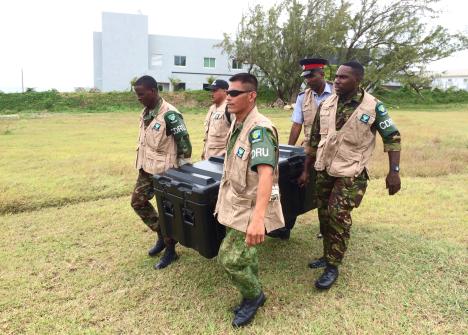 Members of CDRU team participating in the field training exercise at the Regional Security System Headquarters, Paragon, Christ Church, Barbados.
Members of CDRU team participating in the field training exercise at the Regional Security System Headquarters, Paragon, Christ Church, Barbados.
BRIDGETOWN, Barbados.- Thirty-two participants from the disciplined forces, including police, military and fire services, successfully completed four days of training in preparation for their role in providing relief and humanitarian assistance in the event of a disaster. The annual training workshop of the CARICOM Disaster Relief Unit (CDRU) was held at the Caribbean Disaster Emergency Management Agency’s (CDEMA) headquarters in Barbados from August 8 to 12, 2016.
The training was facilitated by CDEMA in collaboration with the Regional Security System Headquarters (RSS HQ) with funding from the US government through the US Southern Command. The CDRU is one of the specialised teams trained by CDEMA each year as part of the Regional Response Mechanism (RRM).The RRM is coordinated by CDEMA to provide humanitarian and technical support in a timely manner if requested by any of the CDEMA’s 18 participating states.
The system is extremely dependent on the readiness and willingness of the governments of participating states, regional institutions, key development partners, agencies of the United Nations and humanitarian partners to work together in offering immediate assistance when the call comes from the CDEMA Coordinating Unit.
From 1992 -2015 the Regional Response Mechanism has been in action 17 times and in several instances to multiple islands at the same time. The response has been to disasters resulting from volcanic eruptions, earthquakes, and weather related events.
In his feature address at the closing ceremony last Friday, Ronald Jackson, executive director of CDEMA said, “I am very proud of what we have accomplished together, not just this week but over the past 25 years of CDERA’s/CDEMA’s existence. Whilst many were talking about civil/military cooperation and coordination, the CARICOM Community under the leadership of CDEMA and in partnership with the RSS and the region’s military, security and fire chiefs were actually actively doing it.”
“The significance of the RRM and the CDRU should not be understated. There is real capacity in the region to assist our participating states,” he added.
The CDRU comprises military, fire and police assets drawn from the 18 CDEMA participating states. The Unit is deployed to provide humanitarian assistance in direct support to the civil authorities of any state affected by natural or technological hazards. The CDRU’s mission is to conduct disaster response and relief operations and its main tasks include the management of relief supplies, emergency telecommunications and the provision of appropriate personnel for repairing critical lifeline facilities.
The four-day training included introductions to disaster management, national disaster management and the National Emergency Operations Centre (NEOC), introductions to the Regional Supply Tracking System (RSTS), incident command system, urban search and rescue in CDEMA participating states, dignity and human rights and civil/military coordination.
The training concluded with a field training exercise that allowed the Unit to perform their specific roles in a hazard impact scenario with bases established at the airport and sea port. The field exercise setting allowed for the various phases of operations to be tested – from alert to deactivation.
The CDRU is activated, mobilised and deployed by the Regional Security System’s Central Liaison Office (RSS/CLO) in consultation with and on behalf of CDEMA. Its operations are guided by the CDRU operational plan, standing operating procedures and a memorandum of understanding between CDEMA and the RSS.
